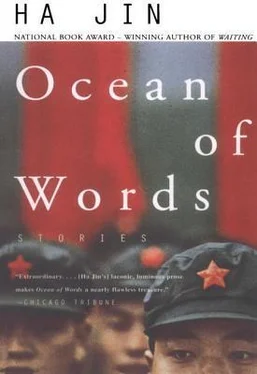On hearing of the incident at daybreak, Commander Deng and I set out for Garlic Village right away. It was crisply cold, and a large flock of crows were gliding over the snow-covered fields, clamoring hungrily. A few firecrackers exploded in the village that sprawled ahead like a deserted battlefield. Among some wisps of cooking smoke, two roosters were crowing on and on, as if calling each other names. In the north, the Wusuli River almost disappeared in the snow, and beyond it a long range of cedar woods stretched on the hillside like a gigantic spearhead pointing to the Russians’ watchtower, which was wavering in the clouds. Though day was unfolding, the Russians’ searchlight kept flickering.
When we arrived Kong was still in bed. The girls were all up, some washing clothes while others were combing and braiding their hair. They looked jubilant, humming light tunes and giggling as if something auspicious had descended on their household. At the sight of us they stopped.
“Lock up the door and don’t let anyone out,” Commander Deng cried. With a mitten he wiped the frost off his mustache, his deep-sunk eyes glinting. He spat a cigarette end to the floor and stamped it out. Orderly Zhu executed the orders.
Kong Kai heard the noise and got out of bed to meet us. He didn’t look worried and gave us a toothy grin. His broad face was smeared with soot, but he still had on his fur hat, whose earflaps were tied together under his chin. I felt relieved; it seemed he hadn’t taken off his clothes during the night. We brought him into the inner room and began our questioning.
It took us only a few minutes to finish with him. He tried to convince us that he had slept well. That must have been a lie. How could a young man sleep peacefully while a girl was sitting nearby with her eyes on him all the time? And another four sleeping on the same bed? Didn’t he know his face still had stains of lamp soot on it? But we didn’t ask him those questions, for it wasn’t important for us to know how he had felt and what he knew. We cared only what he had done.
Convinced that nothing serious had taken place, we put him aside and brought in the girls one by one. Each questioning was shorter than two minutes. “Did he touch you?” Deng asked a tall, pale-faced girl, whom we had got hold of first.
“No.” She shook her head.
“Did he say anything to you?”
“Un-un.”
“Yes or no?”
“No.”
“Did he ever take off his clothes?”
“No.”
In the same manner we went through the other four girls, who gave us identical answers. Then we brought our man home, believing the case was closed. On the way back I criticized Kong briefly for intruding into a civilian house without any solid reason, especially on the Spring Festival’s Eve, when the Russians were most likely to cross the border and nobody was allowed to leave the barracks.
At once Kong became a hero of a sort. Those foolish boys called him “an iron man.” Together with his fame, numerous versions of his night adventure were circulating in the company. One even said that the girls had welcomed Kong’s arrival and lain beside him by turns throughout the night, patting his face, murmuring seductive words, and even drawing a thick mustache on his lip with charcoal, but the iron man hadn’t budged a bit, as though he were unconscious. We tried to stop them from creating these kinds of silly stories and assured them that the girls were fine, not as bad as they thought. They’d better cleanse their own minds of dirty fantasies.
A month later Kong’s squad leader, Gu Chong, was transferred to the battalion headquarters, to command the antiaircraft machine gun platoon there. Gu suggested we let Kong take over the Fifth Squad. Indeed Kong seemed to be an ideal choice; the men in our company respected him a lot, and he was an excellent soldier in most ways. So we promoted him to squad leader.
Who could tell “the iron man” would be our headache? In a few weeks it was reported that Kong often sneaked out in the evenings and on weekends to meet a girl at the Youth Home. There were larch woods at the eastern end of Garlic Village; it was said that Kong and the girl often wandered in the woods. I talked to him about this. He said they had gone in there only to pick mushrooms and daylilies. What a lie. I told him to stop pretending. Who would believe the iron man had become a mushroom picker accompanied by a girl? I wanted him to quit the whole thing before it was too late, and I reminded him of the discipline that allowed no soldier to have an affair.
One Sunday morning in April, Orderly Zhu reported that Kong had disappeared from the barracks again. Immediately I set out with Scribe Yang for the larch woods. When we got there we came upon two lines of fresh footprints on the muddy slope. We followed them. Without much difficulty we found the lovers, who were sitting together by a large rock. They saw us approaching, and they got up and slipped away into the woods. We walked over and found five golden candy wrappers at the spot. I told the scribe to pick up the wrappers, and together we returned.
Scribe Yang said he recognized the girl, whose name was An Mali. The tall, pale-faced one, he reminded me. I recalled questioning her and didn’t feel she was a bad girl at all, but a rule was a rule, which no one should break. Kong was creating trouble not only for himself but also for our company. We had to stop him.
Soon the leader of the Second Platoon reported that there had been confrontations between Kong and some men in the Fifth Squad. One soldier openly called him “womanizer.”
In May we held the preliminary election of exemplary soldiers. As usual, we had all the guns and grenades and bazookas locked away at the company’s headquarters for five days, for fear somebody might be so upset about not being elected that he would resort to violence. There had been bloodshed during the election in other units, and we had to take precautions.
All the squad leaders were voted in except Kong Kai, though three of his men got elected. The soldiers complained that Kong had a problematic life-style. Commander Deng and I worried about the results of the election, particularly about Kong, so we decided to talk to him.
After taps, we had him summoned to our office. The kerosene lamp on the desk was shining brighter with the new wick Orderly Zhu had put in. I walked to the window to look out at the moonlit night while Deng read a newspaper at the desk. Beside his elbow lay a blue notebook and a pen; whenever he came across a new word, he would write it down. He had only three years’ education.
In the distance a Russian helicopter was flickering and hammering away among the stars. The hills beyond the border loomed like huge graves. I was wondering how Kong had started the affair. When we had questioned him and the girls three months before, we had been quite certain nothing had happened to him. How did the seed of love enter his brain? Was it because she had smeared lamp soot on his face?
Kong’s stocky body emerged on the drill ground coming to the headquarters. I returned to the desk and sat down by Deng. “Take a seat, Little Kong,” I said the moment he stepped in.
Straight to the point, we asked him what he thought of the election, and he admitted he felt bad about being voted out. His almond eyes kept flashing at us. I handed him a cigarette, which he declined.
“Three months ago,” Deng said, “you were ‘an iron man’ in your comrades’ eyes, but all of a sudden you become a womanizer to them. How can you explain the change?”
“I’m not a womanizer.”
“Let’s get this straight,” I said. “When we picked you up at the Youth Home, you said you hadn’t done anything with the girls. Did you lie to us?”
“No, I didn’t.”
Читать дальше











